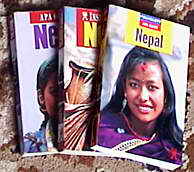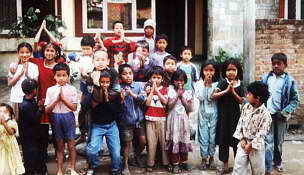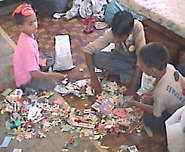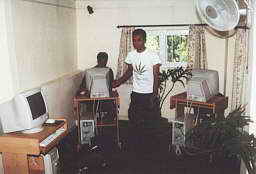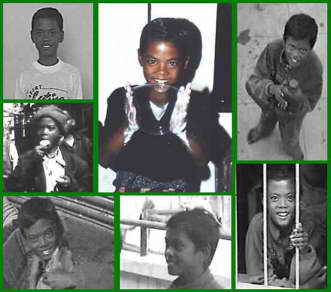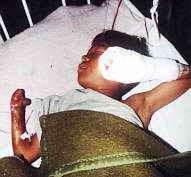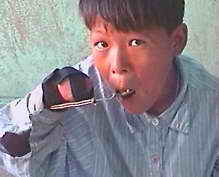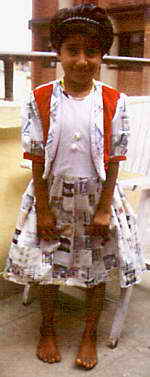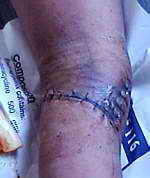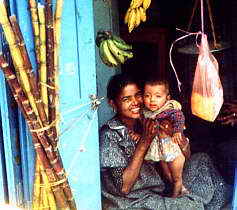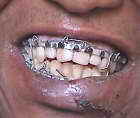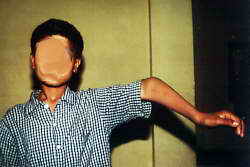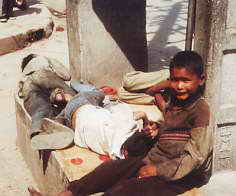Indonesia:
I had been in Germany just for six days, then one week on Bali before my friends arrived and we spent three weeks travelling - still writing every evening on the guidebook. Towards the end of this tour I finally came to Lombok and met many of our children - some even coming by public bus from their village to our hotel to meet me.
After my friends left, I first stayed on Bali and took care of Kadek: He was fine and I was happy to see that he had used his artificial foot and leg so much, so they were totally worn and could hardly be used any more.
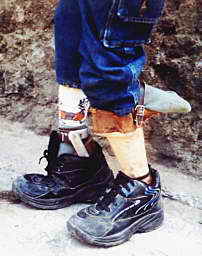
That was good news! - I had been so sceptical and had thought that he might not be able to walk on these. But actually he wears them all day and is very happy to have them. We had them repaired and adjusted to his increasing size.
But after just a few weeks they were so worn that I could easily guess that they would not last a further 9 months (until I will return next year). So I suggested (and it took some time to convince the orthopedician of this "crazy idea") to make the false feet smaller so they would fit into ordinary shoes. The "special equipment" (that could only be repaired in Denpasar and the father could not afford) would be protected; and the ordinary shoes, if worn, could be replaced by Kadek's father in any shop nearby. (Besides this, the ordinary shoes look much better and more "normal" than those that the orthopedician had made. - Kadek was very happy.)
The orthopedic surgeon gave us a date in the middle of July. For the weeks of waiting for this date I brought Kadek back to his village (and school) and went to Lombok myself.
Then surgery on his left hand was done. This hand has only three fingers; the two fingers are joined by skin, and the "index finger" and thumb have only one common root bone. Thus the whole hand was stiff.
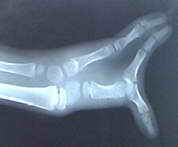
X-ray before the surgery.
The idea was to remove that one finger that was unmoveably connected to the thumb, so he could move the thumb and remaining finger to grasp any items.
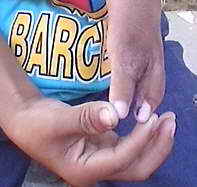
Surgery was done without any problems; after 2 days he left the hospital. I brought him to his relatives in town (who took him to the doctor every week) and went to Lombok myself. I phoned them every other week and they told me "he's doing fine" and finally "we brought him back to his village".
So I stayed on Lombok until shortly before my return flight to Germany and visited Kadek and his family only in September. I was quite shocked and disappointed when I saw the result of the surgery: It had healed well and the hand was "fine", but the surgery did not bring the improvement we had hoped for. The hand is nearly as useless as before; he can bend the remaining two fingers a bit, but they don't touch each other, he cannot "close" them or grasp anything.
For a change not from my diary, but from the German "Latest news" on the Internet pages. Because nothing special had happened I just described a typical day of my life on Lombok / Indonesia:
Usually one to three children spend the night in my room, because the mother works, or because they live too far away and can only get our dinner if they don't have to go home, or just because they want to use our toys and games till evening instead of spending their time at home or in front of the neighbour's TV. So every morning at 6.20 the alarm clock rings, so these children go back home and from there, to school.
I go right back to sleep and usually after 7.30 get woken up by the next group of children. The school neither has enough rooms nor enough teachers, so grades 3 and 4 get their lessons in the afternoon. Those kids should actually wake me up at 8 o'clock, but usually from 7.30 sit in front of my room (not so quietly) waiting for their breakfast. As soon as I wake up we use playing cards as a lottery to determine 2 children who have to go and buy breakfast for all of us: Sticky rice and vegetables packed in banana leaves which we eat on the small veranda in front of my room or sitting in the garden.
Most days the children go to the beach after breakfast. And when they have returned, showered - and rid the room of all that sand that stuck to their feet, they take out all the games and toys - cards, dices, Memory and Malefitz, "4 wins" and chess and jigsaw puzzles of all sizes as well as colour pencils and that paper that I beg for in the photocopy shops: One side used and spoiled and the back good enough for colourful drawings.
Around 11 o'clock they usually go home; soon they have to pray and go to school after that. If I have to go to town with some of them, I may send the others away much earlier. If not, now is my time to be alone, to go to town, to do my shopping, to visit some friends, but I do not like to stay long, because after 1 o'clock the "morning kids" (including ALL the kids from secondary school) come back from school and want their lunch. And they are huuuungry!!! Because most of them have to go to school so early that I cannot give them breakfast. For good reason I never give them money - and at home they hardly ever get any food in the early morning. As soon as they arrive (or I come back while they are waiting already) we again draw cards to determine who has to go and buy lunch: Ordinary boiled rice with vegetables and a bit of meat or fish, once again packed in banana leaves, so we can eat it at the hotel.
These children - mostly a bit older - afterwards usually go on their own: to see friends, play soccer or to fly their kites.
At 5 p.m. the afternoon-pupils come back from school and want their late lunch (because their parents didn't give them any money to buy anything at school).
Just after 6 p.m. I tell all the children to go back home for their evening prayers and Koran-lessons.
It will be nearly 8 o'clock before the last children have come back and we can go for dinner. This is the richest and most expensive meal of the day and we take it in a small restaurant 200 meters down the road. Most of the children are not even filled with just one plate and I allow them to take another half plate of the same food - the typical Indonesian "mixed rice", i. e. boiled rice with small portions of all imaginable kinds of other food, such as two different vegetables, a little bit of minced meat, a small peace of chicken, some fish, some peanuts, half a boiled egg and so on.
After dinner I pay out any money that they need to pay at school the next day or buy anything, and write down their "orders" for what I have to buy in town and at the wholesale the next day.
Those days pass by so quickly - and are a lot of fun !!!
When I came to Denpasar (with a Video of the hand to show him) the doctor had gone to Jakarta and was due to come back one month later. So it will not be until 2003 that I can ask him and find out why it did not work out as expected and whether any more improvement is possible and wether we will have to do yet another operation.
News from Lombok during this summer is much better and I was really happy and satisfied. All the kids passed their exams, some had excellent marks and some were first or second in their class. Emis who had run away last year to work, was accepted at the same school again (though she lost one year by her "excursion"). Alimudin, who for years could not be controlled and had quit school twice already, started again after I stipulated that a good part of the starting expenses would have to be borne by himself and his family. Now he is eager, avoids any fight and quarrel and even the teachers are happy with his behaviour.
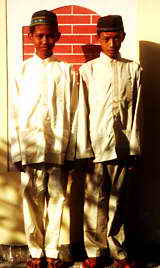
Besides two different uniforms and the sport dress now the children on Lombok have to buy yet another set of clothes: The islamic dress that they wear every other friday.
Many new children, a few new students, but we have increased our numbers significantly because many of our kids this year were promoted from elementary to junior highschool. So far the parents had paid the school themselves and the children came only for food, medicines and to play and paint. But the new school is much more expensive and I took responsibility for their payments. - And on Lombok alone we already have 5 Students (including one girl) in senior highschool (grades 10 to 12) which is even more expensive.
- So very slowly it is beginning to be "work" in Indonesia as well - at least during the weeks after the exams when all the children have to be admitted or re-admitted, - and I even have to help them filling forms and writing applications because most of the parents cannot help them with this.
One day we hired a minibus to go to town with 14 children and youths in one go to buy for all of them dresses, bags, shoes - and have 9 of them their hair cut. (The two youths who started in the electro wing of the technical senior highschool had been given in writing that on their first day they must come "in clean dress and with hair not longer than 1 centimetre" - !)
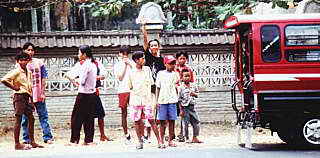
14 of them and 2 of us hired a car to go shopping in town.
Once I bought more then 350 exercise books all at once - but that wasn't enough; the remainder I bought later in smaller quantities.
The only disappointment was Mardin: He had sent me an e-mail in December telling me that he had finished his education, and it was not until August that I found out that he had not even handed in the last part of his exam papers. After a lot of discussions I once again gave him some money so he would not have to work and would have the time to finally write his paper, pay the rent for type writer and computer so hopefully he will get his certificate very soon.
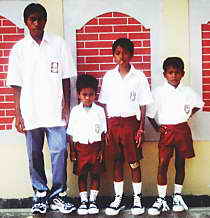
Four pupils in new dresses:
3x primary an 1x higher secondary school.
And one girl of 12 years quit school because she was only in the 4th grade, quite tall, and was always teased by all the other much smaller children. With tears in her eyes she promised that she would continue to learn at home; but could by no means be convinced to go back to school.
I was very happy to notice that the people of this conservative Islamic village come to trust me more and more. When I started here, there were at best "mixed feelings": What does this foreigner want? Would he give food to our children that is not fit for Muslims? Would he even try to convert them to his religion or would he allow them to play at times when they should go home for prayer?
But now the parents come to my room to ask for help or even advice, to discuss the school problems of their children with me. The football club included me in the list of possible sponsors when they collected money to buy a first aid kit; and once, even the mayor of the village came to visit me.
Another piece of good news (that I realised only while closing my accounts before returning to Germany): Never before had so few children been sick; never before had I gone to the hospital or a doctor as seldom as this year.
I had the splint remove from Amir's leg that he had broken years ago in a car accident. And a small boy whose circumcision had been spoiled in the village I had properly circumcised at the hospital. Apart from this, my medical file this year shows only cough drops, eye drops, head lice and similar trifles.
From 15th September I spent 4 weeks in Germany. Once again time was just running out and many things were unfinished when I left for Nepal.
What has happened since, you can read on the "latest news".
back to the top
| 